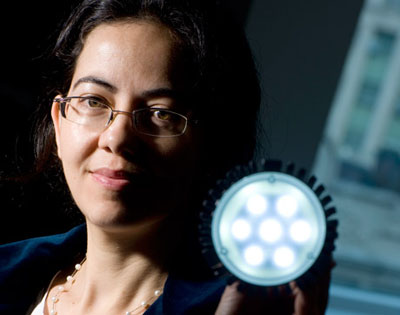Hatice Altug: Diagnosing Disease
By Amanda Davis
NOTE: This is an overview of the article, which appeared in March 2012 issue of THE INSTITUTE magazine.
Click here to read the entire article.
IEEE Member Hatice Altug leads a research team at Boston University that is working to develop a portable biosensor that eventually will help diagnose common human ailments such as food poisoning or swine flu faster and more easily.
An assistant professor of electrical and computer engineering at BU, Altug was recently recognized by U.S. president Barack Obama for her work on the sensor. In 2011, she was one of the recipients of the Presidential Early Career Award for Science and Engineers, an honor bestowed by the federal government on science and engineering professionals in the initial stages of their careers.
Altug received her Ph.D. in applied sciences from Stanford University in 2006, after getting her bachelor’s degree in physics in 2000 from Bilkent University, in Ankara, Turkey. In 2007, she joined Boston University and helped form the Laboratory of Integrated Nanophotonics and Biosensing Systems./p>
The article describes the sensor chip that Altug and her team are currently developing under a U.S. National Institutes of Health grant. The chip could speed the analysis of viruses from the current process, which can take days, to less than 30 minutes. To diagnose a patient’s illness, doctors often take a sample of bodily fluid, send it to a laboratory, and wait for a technician’s analysis. Altug and her team aim to streamline the process with their handheld sensor, which can detect viruses in less than 30 minutes. The group plans to work during the next five years to make the sensor more accurate and less expensive to manufacture.
Altug also garnered recognition last year from several associations and publications. For example, she received the IEEE Photonics Society’s Young Investigator Award for her contributions to the sensor. She was named one of the Popular Science Brilliant 10 [October], and her work was featured in a Lab on a Chip Journal cover article [Royal Society of Chemistry, November].
Altug also dedicates a lot of her time to mentoring current and prospective engineering students, as well as their instructors. Since 2007 she has taught a seminar on nanophotonics and nanofabrication as part of Boston University’s Upward Bound Math Science program. The program provides on-campus housing and intensive classes during the summer to low-income high school students.
Altug helped introduce the first engineering course for high schoolers in BU’s Summer Challenge program in 2009. This program offers short but intensive courses to help students learn more about fields they plan to study in college.
She also works with preuniversity science teachers to incorporate nanotechnology and photonics into hands-on projects for their students. She says she wants to give students a taste of what attracted her originally to engineering: a penchant for building useful tools and gadgets.
“I realized early on that I could apply my creativity in a practical way if I studied physics and engineering,” she says.
Developing health-care technology was particularly appealing because of its potential impact on society, she continues: “Our work can reduce the cost of diagnosing disease or even play a role in finding a cure for some. That is what motivates and inspires me.”







